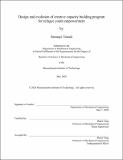| dc.contributor.advisor | Maria Yang. | en_US |
| dc.contributor.author | Tenali, Srimayi. | en_US |
| dc.contributor.other | Massachusetts Institute of Technology. Department of Mechanical Engineering. | en_US |
| dc.date.accessioned | 2020-10-08T21:27:56Z | |
| dc.date.available | 2020-10-08T21:27:56Z | |
| dc.date.copyright | 2020 | en_US |
| dc.date.issued | 2020 | en_US |
| dc.identifier.uri | https://hdl.handle.net/1721.1/127867 | |
| dc.description | Thesis: S.B., Massachusetts Institute of Technology, Department of Mechanical Engineering, May, 2020 | en_US |
| dc.description | Cataloged from the official PDF of thesis. | en_US |
| dc.description | Includes bibliographical references (pages 40-41). | en_US |
| dc.description.abstract | There are over 5,000 unaccompanied refugee minors in Greece who have fled violence from Syria, Pakistan, Afghanistan, and Iraq. In addition to pre-existing trauma and psychological challenges, living in shelters and streets has further put youth at risk of trafficking, exploitation, and substance abuse. In 2017, MIT D-Lab partnered with Faros, a Greek NGO, to develop a design workshop for the unaccompanied minors. At the end of training, they demonstrated an improved capacity to identify and solve challenges, work in teams, and recognize self-potential. Since then, this weeklong design workshop has evolved into a multi-stage, modular training program taught over several months. The purpose of this study was to identify the successes and failures of each developmental stage of this program to determine overarching trends for building a design curriculum for vulnerable youth populations. Analysis revealed that cultural significance, flexible structure, and addressing social and behavioral concerns are among the key elements for effectively reaching refugee youth. By documenting the evolution and implications of these factors, we hope to provide a baseline for future education work with this unique and vulnerable population. | en_US |
| dc.description.statementofresponsibility | by Srimayi Tenali. | en_US |
| dc.format.extent | 41 pages | en_US |
| dc.language.iso | eng | en_US |
| dc.publisher | Massachusetts Institute of Technology | en_US |
| dc.rights | MIT theses may be protected by copyright. Please reuse MIT thesis content according to the MIT Libraries Permissions Policy, which is available through the URL provided. | en_US |
| dc.rights.uri | http://dspace.mit.edu/handle/1721.1/7582 | en_US |
| dc.subject | Mechanical Engineering. | en_US |
| dc.title | Design and evolution of creative capacity building program for refugee youth empowerment | en_US |
| dc.type | Thesis | en_US |
| dc.description.degree | S.B. | en_US |
| dc.contributor.department | Massachusetts Institute of Technology. Department of Mechanical Engineering | en_US |
| dc.identifier.oclc | 1196826233 | en_US |
| dc.description.collection | S.B. Massachusetts Institute of Technology, Department of Mechanical Engineering | en_US |
| dspace.imported | 2020-10-08T21:27:55Z | en_US |
| mit.thesis.degree | Bachelor | en_US |
| mit.thesis.department | MechE | en_US |
